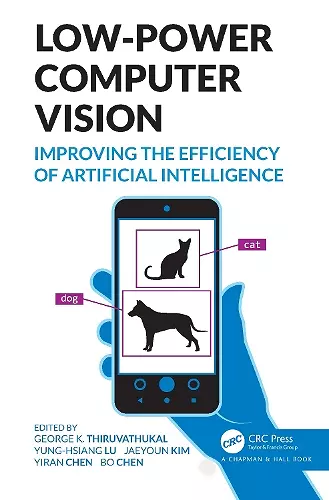Low-Power Computer Vision
Improve the Efficiency of Artificial Intelligence
Bo Chen editor Yiran Chen editor George K Thiruvathukal editor Yung-Hsiang Lu editor Jaeyoun Kim editor
Format:Hardback
Publisher:Taylor & Francis Ltd
Published:23rd Feb '22
Currently unavailable, and unfortunately no date known when it will be back
This hardback is available in another edition too:
- Paperback£47.99(9780367755287)

Energy efficiency is critical for running computer vision on battery-powered systems, such as mobile phones or UAVs (unmanned aerial vehicles, or drones). This book collects the methods that have won the annual IEEE Low-Power Computer Vision Challenges since 2015. The winners share their solutions and provide insight on how to improve the efficiency of machine learning systems.
On device AI has become increasingly important for reasons of latency, privacy and overall autonomy as computing becomes more and more ambient. Moreover, making AI, in particular computer vision, efficient and run well in low resource computing environments using frameworks like PyTorch is a priority of the industry to enable this. The IEEE Low-Power Computer Vision Challenge is one such effort that has and continues to push the field forward allowing us to make progress in this area. Facebook has been a proud sponsor and supporter of this challenge since 2018 and this book presents the winners’ solutions from previous challenges and can guide researchers, engineers, and students to design efficient on device AI.
-- Joe Spisak, Product Lead at Facebook Artificial Intelligence
Computer vision is at the center of recent breakthroughs in artificial intelligence. Being able to process visual data in low-power computing environments will enable great advances in the field in areas such as edge computing and Internet of Things. This book presents work by experts in the field and their winning solutions. It is an indispensable resource for anyone interested creating AI technologies in resource constrained computing environments
-- Mark Liao, Director, Institute of Information Science, Academia Sinica
From mobile phones to wearable health monitors, improved energy efficiency is the enabling technology of everything we take for granted today. Computer vision is at the center of artificial intelligence and machine learning. Today, artificial intelligence and low power are often at different ends of the spectrum. Low-power computer vision will enable greater adoption of the technologies in battery-powered IoT (Internet of Things) systems. This book collects the winners’ solutions of the Low-Power Computer Vision Challenge and provides insight on how to improve efficiency of artificial intelligence.
-- Edwin Park, Principal Engineer at Qualcomm
ISBN: 9780367744700
Dimensions: unknown
Weight: 820g
436 pages